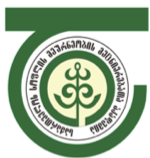This website uses cookies so that we can provide you with the best user experience possible. Cookie information is stored in your browser and performs functions such as recognising you when you return to our website and helping our team to understand which sections of the website you find most interesting and useful.

History of GAAS
07 02 2020
GEORGIAN ACADEMY OF AGRICULTURAL SCIENCES Georgian Academy of Agricultural Sciences is a self-governing organization which holds full autonomy and is financed from the state budget. It defines the priorities in agriculture, coordinates scientific-research works and provides consultations regarding agricultural issues to the government. The Academy was founded on December 12, 1957. It is directed by […]
 GEORGIAN ACADEMY OF AGRICULTURAL SCIENCES
GEORGIAN ACADEMY OF AGRICULTURAL SCIENCES
Georgian Academy of Agricultural Sciences is a self-governing organization which holds full autonomy and is financed from the state budget. It defines the priorities in agriculture, coordinates scientific-research works and provides consultations regarding agricultural issues to the government.
The Academy was founded on December 12, 1957. It is directed by the Presidium of the Academy chaired by Academician Guram Aleksidze.
Georgian Academy of Agricultural Sciences employs: academicians- 31, corresponding members -3, Scholarships -7, Academy honorable Members are Dr. Adel El-Beltagy (Egypt), Dr. Raj Paroda (India), Patriarch of Georgia Ilia the II.
With the participation of scientists of Georgian Academy of Agricultural Sciences, new varieties of agricultural crops and livestock have been created in Georgia, dozens of new, competitive products in the food and processing industry; Georgia is a homeland of tea harvesting machinery technologies. Up to 50 new machines and technical facilities designed by the Academy members. It should also be noted that out of the 23 existing wheat varieties in the world, Georgia is home to 14 varieties. Georgia is recognized as homeland of grape and Wine with 500 local vine species.
Since 2014, the Georgian Academy of Agricultural Sciences is the member of the Union of European Academies for Science applied to Agriculture, Food and Nature (UEAA). For many years it maintains active cooperation with the world acknowledged scientific and research organizations applied to agriculture, such as:
- CGIAR (USA) – Consultative Group for International Agricultural Research.
- ICARDA (Marocco) – International Center for Agricultural Research in the Dry Area;
- CIMMYT(Mexiko). International Maize and Wheat Improvement Center;
- ICRISAT (India). International Crops Research Institute for the Semi-Arid Tropics;
- BIODIVERSITY INTERNATIONAL (ITALY) – A Global research organization for development of Plant genetic Resources;
- ACIRO (Taiwan). World Center for Vegetable Growing;
- CACAARI (Uzbekistan) – Central Asia and the Caucasus Association of Agricultural Research Institutions;
- IFPRI (USA) International Food Policy Research Institute;
- BACSA (Bulgaria) Black and Caspian Seas and Central Asia Silk Association;
- CIP (Peru) International Potato Center.
Georgian Academy of Agricultural Sciences cooperates with the Chinese and Republic of Korean Academies of Agricultural Sciences, the Belarus and Ukraine National Academies of Agricultural Sciences, Vavilov Institute of Plant Genetic Resources (Russia); Also Memorandums of Understanding was signed with Republic of Korea National Agrobiodiversity Center; Poznan University of Life Sciences (Poland); National University of Bioresource and Natural Resources (Ukraine); Vinnitsa, Podolsk and The Bila Tserkva National Agrarian Universities (Ukraine); Tairov Institute of Viticulture and Winemaking (Ukraine); Kazakh Scientific Research Institute of Mechanization and Electrification of Agriculture;
There are 6 scientific departments currently functioning at the Academy: Agronomy, Livestock and Veterinary, Agro-Engineering, Forestry, Food safety and production, Economic departments. Besides there are academic and administrative departments, capacity building center, publishing center “ Agro”, Coordinating Center for Nature Protection, Plant Genetic Resources and Agro-biodiversity; Scientific -Coordinating Center of Ajara Autonomous Republic.
Georgian Academy of Agricultural Sciences during its 60-year existence has published more than 7 700 scientific papers, Among 203 are monographs and 155 text-books; 380 inventions and patents; 25 new species are selected by our scientists in plant growing and animal husbandry; Moreover, 131 certificates have been conveyed to GAAS researchers for their practical innovations.
In recent period Georgian Academy of Agricultural Sciences has conducted a succession of other important works and events which laid a solid basis for effective collaboration with Georgian Government, promoting and supporting successful practical implementation of scientific achievements of agricultural sciences.
